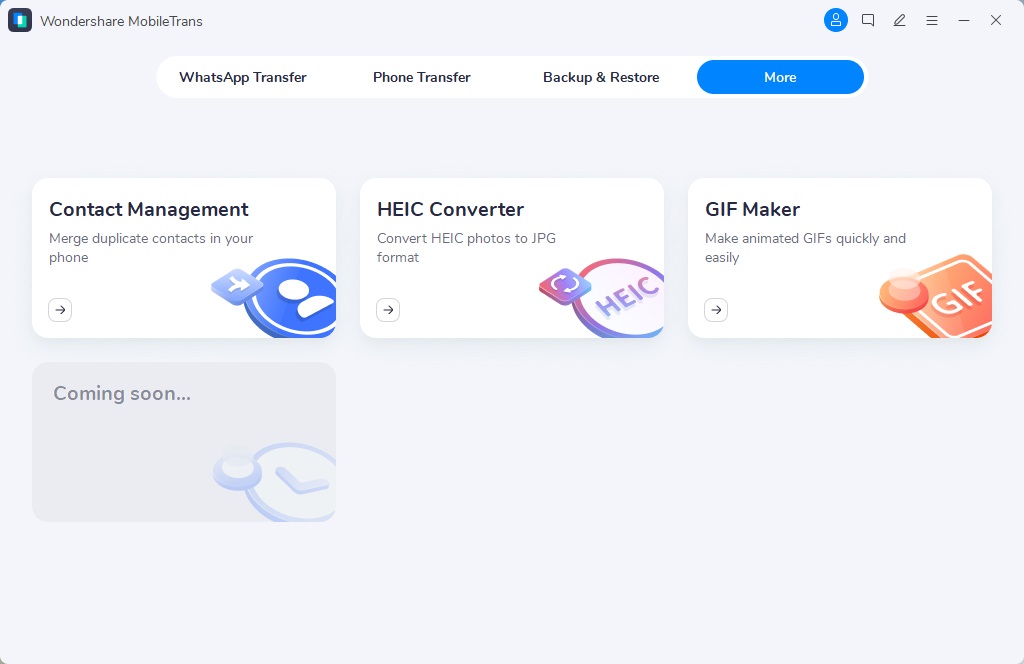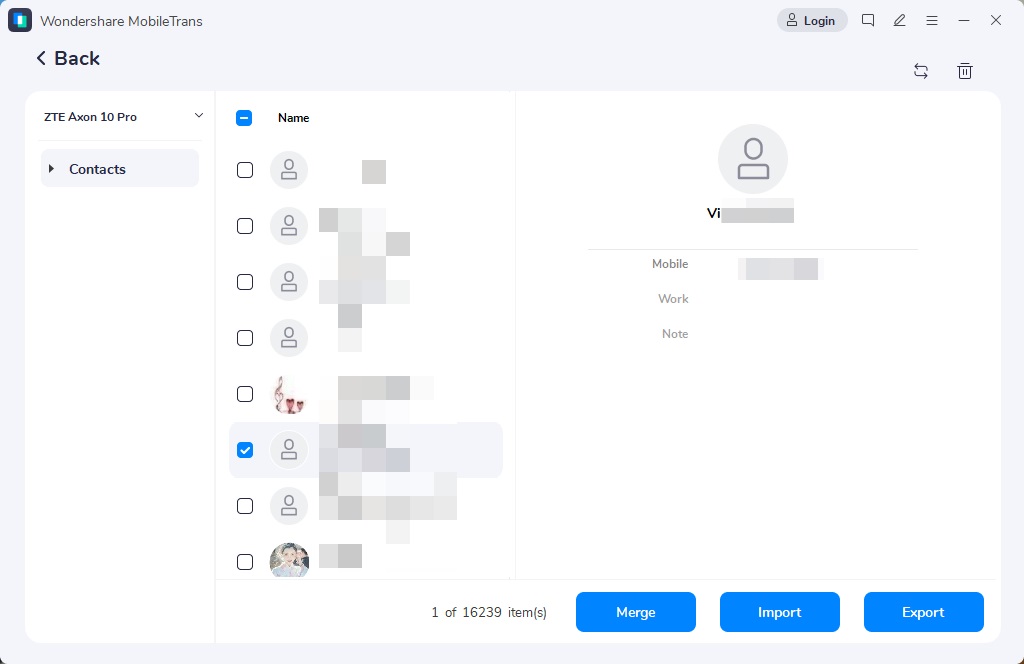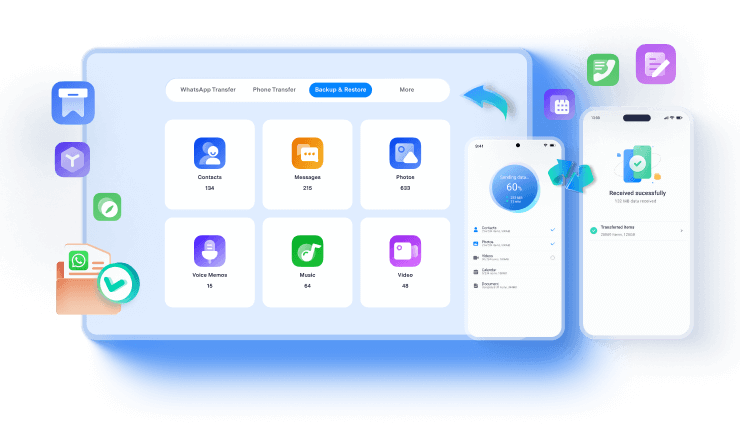I want to export my contacts from Outlook to backup my data. What are the possible ways?
Several reliable solutions can always come in handy when you're looking to export outlook contacts. However, it depends on the format you want to export the Outlook contacts. While some people want to export Outlook contacts in CSV, others wish to have it in PST or vCard. Irrespective of the format you're looking to export Outlook contacts to, you need the right solution that works to get the job done smoothly.
To save you from unwanted stress, we've created this ultimate guide to teach you different working methods to export Outlook contacts to CSV, vCard, or PST. Plus, you'll discover the best software to export Outlook contacts. So, without wasting much of your precious time, let's dive to get cracking.

Part 1: Export Address Book from Outlook to CSV
It's effortless to export Outlook contacts to CSV. This is because Outlook supports a feature that allows users to easily export contacts to CSV files without needing to install third-party software.
Here, we've discussed four different methods you can utilize to export address book from Outlook to CSV
Method 1: Export Contact List from Outlook 2021/2019/2016/2013
This method is for you if you're running Outlook 2012/2013/2016/2019. Follow the below steps to export contacts from Outlook to CSV without error.
Step 1: Start the Outlook app and navigate ti the Menu section > Click on 'File' > Select “Open & Export” option > choose“Import/Export”.

Step 2: Choose 'Export to a File' and click 'Next'.

Step 3: Under the 'Create a file type' option, select "Comma Separated Value".

Step 4: Up next, you'll be asked to select a folder to export from. Choose the 'Contacts' folder and click Next to proceed.

Step 5: Click on 'Browse', then select a preferred storage location on your PC to save the file. Then, hit the 'Next' button.

Step 6: Tick the checkbox next to "Export contacts from the folder: Contacts", then click the 'Finish' button to complete the action.

Method 2: Export Contacts from Outlook 2010
For users running Outlook 2010 on their device, this is how you can export Outlook contacts to CSV I just a few clicks.
Step 1: Launch Microsoft Outlook on your PC, locate the 'File', then select Options.
Step 2: Choose the "Advanced" option and click o "Export" at the right hand side of your PC screen.

Step 3: Hit the "Export to a file" button and click on 'Next' to proceed.
Step 4: Choose "Comma Separated Values (Windows)" under create a file of type.
Step 5: You'll be asked to select the folder to export from select "Contacts" and click "Next".
Step 6: Browse and select the 'Folder' you want to export from Outlook to CSV file. Then, click on Next.

Step 7: Finally, click the "Finish" button. Your Outlook contacts have been successfully exported to CSV.
Method 3: Export Contacts from Outlook 365
You can also export contacts from Outlook 365 to CSV. The process is straightforward too, all you need to do is to follow the steps explained below;
Step 1: Launch the Outlook 365 program and click on the Applications icon. Then select the 'People'
Step 2: Select 'Manage' and click on 'Export' contacts.
Step 3: Click on 'All Contacts' to export all contacts to CSV or choose 'Select a Folder' to export contacts to CSV.
Step 4: Finally, click the 'Export' button to complete the operation.
Method 4: Download Contacts from Outlook.com
Besides using the Outlook program to export contacts to CSV, you can also use Outlook.com to download contacts to CSV. We've explained the procedure to do so below, so just read on.
Step 1: Open icloud.com on your PC browser and log into your Office 365 account. Then, click the "Apps" icon from the main interface and select Outlook.
Step 2: Select 'People' from.the bottom left corner of the screen.
Step 3: Up next, click 'Manage' and choose the 'Export Contacts' option.
Step 4: Navigate to the hearing that says, "Which contacts do you want to export?" and select 'All Contacts' or a contact folder. Then choose CSV as the preferred file format.
Step 5: Finally, click on Export, select the download destination, and extract the contacts.
Now you understand the simple procedures to export Outlook contacts to CSV using different methods, let's proceed to the next part and learn how to export Outlook contacts to vCard files.
Part 2: Copy Outlook Contacts to vCard Files
Even if you cannot export outlook contacts to the .vcf file directly, there are still workarounds, but they are only suitable for limited contacts. Here, we've explained the different workable methods you can always rely on to export Outlook contacts to vCard.
Method 1: Save Contacts as vCard One-by-one
You can simply save contacts as a .vcf file. However, this method allows you to choose only one contact at a time. We've explained how to employ this method below;
Step 1: Open' Outlook' on your computer, then move your cursor to the 'Navigation bar' and click on 'People' or 'Contacts'.

Step 2: Select the contact that you want to save as vCard.
Step 3: Navigate to 'File' and click on 'Save As' to prompt the window to select a destination for your .vcf file.

Step 4: Choose the destination to save the .vcf contact file, then click the 'Save' button to export Outlook contacts to vCard.
Method 2: Export Outlook Contacts to VCF
Another method to export outlook contacts to vCard is by forwarding contacts as business cards. This method allows you to export more than one Outlook contact at a time. You must forward the Outlook contacts as a business card first, then save them to a preferred folder.
Here is the how-to to use this method;
Step 1: Open Outlook, then select the 'Contacts' you're looking to export as VCF.
- Navigate to the top left corner of the page and click on Home, then select 'Forward Contact' and choose 'As a business card'

- For Outlook 2007 or prior, click Actions > Send Full Contact > In Internet Format (vCard).
Step 2: Right-click on the 'Contacts' field from the pop-up message on your screen, then choose 'Select All' from the menu list.

Step 3: Simultaneously click 'CTRL + C' to copy the selected contacts, then open the desired folder on your PC and press 'CTRL + V' to paste the contacts from there.

Part 3: Export Email Addresses from Outlook to PST
The best way to export Outlook contacts to .pst is to export email addresses from Outlook to PST. This method is straightforward and can be used for any version of Outlook you run on your computer. You have to add your Microsoft 365 mail to the Outlook app on your PC, then move contacts to Microsoft 365 mailbox and download it to your PC.
Step 1: Open Outlook app > Navigate to 'File' and select Open & Export. Click 'Import/Export.

Step 2: Choose the 'Export to a File' option from the pop-up that appears and click 'Next' to proceed.

Step 3: When you're asked to select a file type, choose 'Outlook Data File (.pst) and click on 'Next'.

Step 4: Select the email account whose addresses you want to export, then click Next again.

Step 5: Choose the 'Path' where the address is saved and click 'Next'. Then click 'Finish' to complete the action.

Bonus: Transfer Outlook Contacts to Mobile Phone
Applies to: Outlook 2016, Outlook 2013, Outlook 2010
Do you know you can also transfer Outlook contacts directly to your phone? All thanks to the efficient MobileTrans data management software.
MobileTrans is software with various data management tools including contact management, WhatsApp data management, and many more to help users simplify how they manage their phone data.
Also, MobileTrans' clean interface makes it easy to navigate, and users don't need any technical knowledge to employ its tools.
MobileTrans - Contact Management
Best Tool to Manage Your Contact!
- • Transfer Outlook contacts to mobile devices directly.
- • Export phone contacts to vCard and CSV format.
- • Remove duplicate contacts on your devices.
- • Transfer data between phones, including contacts, photos, whatsapp data, and more.
- • Free to backup phone data and WhatsApp data to a computer.

 4.5/5 Excellent
4.5/5 ExcellentHow to use MobileTrans to Transfer Outlook Contacts to Mobile Phone
Ensure the latest version of MobileTrans software is installed on your Windows computer before proceeding with the steps.
Step 1: Run the MobileTrans program and click on 'More' from the options.
Step 2: Up next, connect your phone to the PC using its USB cable and click on 'Contact Management.

Step 3: MobileTrans will detect all contacts on your mobile device and display it on your PC screen.

- Click on 'Import', then select 'from Outlook 2010/2013/2016 from the option list that appears.

Step 4: Choose the account to save Outlook contacts and wait for the process to be finished.
Now you can view your Outlook contacts on your mobile devices. Try MobileTrans to manage your Outlook contacts.
Conclusion
Suppose your Outlook has an extensive contact base that you're looking to export. In that case, all Outlook contacts export methods are introduced on this page. All of them are effective enough to help you manage the operation correctly. It doesn't matter the Outlook version you are running on your computer.
However, if you're looking to transfer Outlook contacts directly to your Android or iOS device, MobileTrans is the ideal tool to help you complete the action quickly and easily.
MobileTrans - Contact Management
Easily import contacts from VCF or CSV files to your mobile devices. Merge duplicate contacts in one click.
New Trendings
Top Stories
All Categories











Axel Nash
staff Editor